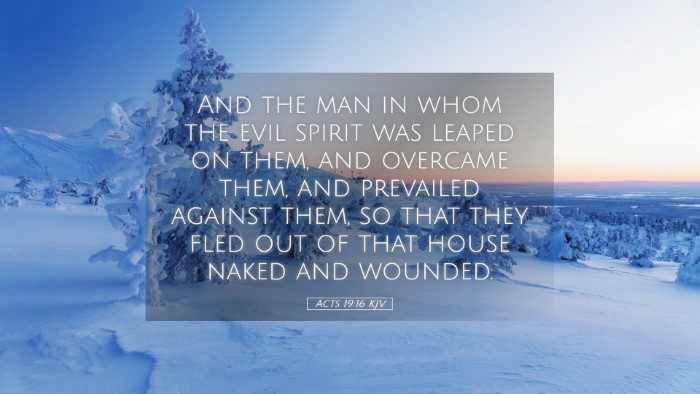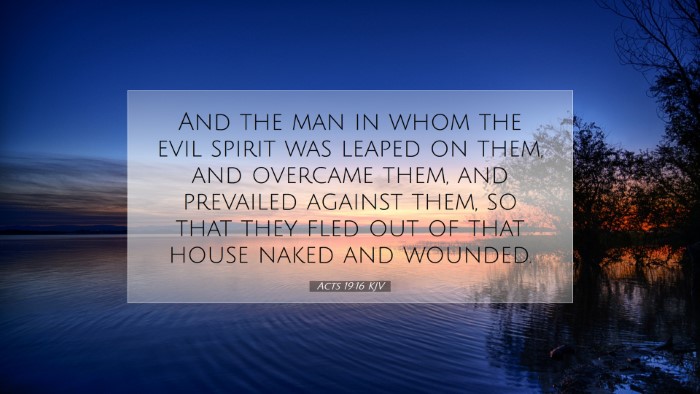Commentary on Acts 19:16
Acts 19:16 states, “And the man in whom the evil spirit was leaped on them, overpowered them and prevailed against them, so that they fled out of that house naked and wounded.” This verse highlights a significant encounter in the early church, illustrating the power of evil forces in opposition to the authority of God’s servants.
Contextual Overview
To fully comprehend the implications of Acts 19:16, it's essential to consider the broader context of Acts 19. Paul was in Ephesus, where he performed extraordinary miracles, and many came to believe in Christ (Acts 19:11-12). In contrast, the actions of the seven sons of Sceva—Jewish exorcists attempting to invoke Jesus' name—demonstrate a significant misunderstanding of spiritual authority.
Insights from Public Domain Commentaries
Matthew Henry
Matthew Henry notes that the sons of Sceva ventured into the realm of exorcism without true faith or understanding of Christ's authority. They believed that merely mentioning the name of Jesus would grant them the same power that the Apostle Paul demonstrated. Henry emphasizes that the name of Jesus is not a magical formula; it must be invoked with true belief and a relationship with Christ.
Henry also highlights the remarkable nature of the evil spirit’s response. The spirit recognized Jesus and Paul but had no recognition for the sons of Sceva, revealing a profound truth about spiritual authority. Only those who are genuinely connected to Christ operate in His power.
Albert Barnes
Albert Barnes provides further insight into the consequences faced by the seven sons of Sceva. He points out that their attempt to cast out a demon resulted in a physical confrontation, illustrating that engaging in spiritual warfare without the true authority that comes from a relationship with Jesus can lead to perilous outcomes. Barnes elaborates that the demon's attack represents the reality that spiritual forces are not to be treated lightly and that understanding one’s position in Christ is paramount for effective ministry.
Barnes also observes that the sons' dramatic defeat was a demonstration of the futility of false religion and superstition. The power and authority of the apostles were not merely based on the invocation of Jesus' name but rather on their embodiment of His spirit and teachings.
Adam Clarke
Adam Clarke brings attention to the significance of the nakedness and wounding of the sons of Sceva. He interprets their flight as symbolic of spiritual vulnerability in the absence of true divine authority. Clarke argues that spiritual battles necessitate preparation and genuine commitment to Christ’s teachings. This incident serves as a warning against presumption in spiritual matters.
Furthermore, Clarke notes the fear that this incident instilled in the people of Ephesus, leading to increased reverence for the name of the Lord Jesus. This outcome is essential for understanding the early church’s impact on surrounding culture. The fear of the Lord and recognition of His power became more pronounced in the aftermath of this event, contributing to the spread of Christianity in Ephesus and beyond.
Theological Implications
This incident raises key theological reflections regarding spiritual authority, the nature of evil, and the importance of faith in ministry. It underscores the necessity for believers to be grounded in their faith and aware of the spiritual realities they engage with.
- Spiritual Authority: True authority in spiritual matters comes from an authentic relationship with Christ. Attempting to wield spiritual power without a true connection to Jesus can lead to disastrous consequences, as evidenced by the defeat of the seven sons of Sceva.
- Recognition by Evil Forces: The admission by the evil spirit that it knew Jesus and Paul points to the reality that evil recognizes authority. Believers must live in a way that conveys their identity in Christ, as this is vital for effective ministry and spiritual warfare.
- The Danger of Presumption: Engaging in spiritual matters presumptively, without prayer, preparation, or a true understanding of one's spiritual standing, leads to vulnerability and defeat in the spiritual realm.
- Impact on Community: The aftermath of this event demonstrates how acts of spiritual authority (or the lack thereof) significantly impact community perceptions of Christ and of the church. Fear of the Lord grew among the people, showing a direct correlation between the church’s authority and its witness to the world.
Applications for Today's Ministry
As pastors, students, and theologians reflect on Acts 19:16, several applications arise for contemporary ministry:
- Emphasize Relationship over Ritual: Ministry should focus on fostering genuine relationships with Christ rather than relying solely on formulas or methods. Engaging with God personally and communally strengthens spiritual authority.
- Teach Awareness of Spiritual Warfare: Educating congregations about the reality of spiritual battles and the nature of the evil one is essential. Equip believers with the knowledge and tools needed to engage in spiritual warfare effectively.
- Promote Authenticity in Spiritual Practices: Encourage authenticity in spiritual experiences. False representation can lead to spiritual impotence and should be avoided at all costs.
- Encourage Holiness and Reverence: Foster a culture within the church that values holiness, reverence for God, and a healthy fear of the Lord. This aligns believers' hearts and minds to the reality of God’s kingdom and His authority.
Conclusion
Acts 19:16 serves as a powerful reminder of the necessity of genuine faith and authority in the life of a believer. The narrative not only provides insight into the early church's struggles but also echoes through the ages, calling today’s believers to uphold the integrity of faith in a world rife with spiritual challenges. Drawing from the insights of Matthew Henry, Albert Barnes, and Adam Clarke, one discerns rich theological themes that continue to inform Christian ministry and scholarship today.


